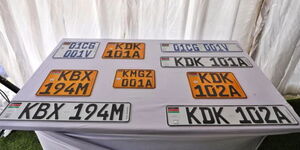Mt Kenya matatu owners on Tuesday, December 29, called for an emergency meeting with officials from the Kenya Railways Corporation (KRC).
This is after KRC reported that at least 5,000 travelers opted to use its new Nairobi-Nanyuki commuter train which has very attractive fare packages.
"We are losing business because anyone would go for lower fares. Ours is a free market. The revival of the railway is good for the country's economy,
"However, there should be some fairness with regards to what passengers pay," Mt Kenya Matatu Owners Association chairman Michael Kariuki stated.
He went on to reveal that the main agenda of the proposed meeting would be to find a way to standardize fares across the two modes of transportation.
Over the Christmas period alone, the 5,000 passengers who travelled via train from Nairobi to Nanyuki translated to Ksh3 million in lost potential revenue.
The average fare charged by matatus on the same route is Ksh600.
The Nairobi-Nanyuki commuter train made its maiden trip on December 12, with Ksh200 set as the standard fare.
Kenya's matatu industry is currently facing collapse following changes in the transport industry.
Matatu operators have had to hike fares in a bid to stay afloat, as the limited number of passengers (due to the Covid-19 pandemic) coupled with spiking fuel prices has hit hard.
In October 2020, Matatu Owners Association Chairman Simon Kimutai dismissed claims that the introduction of commuter rail services posed a major threat to the sector.
This was after reports that matatus would be barred from entering Nairobi's Central Business District (CBD) when the much-anticipated Nairobi Commuter Rail Service was launched.
Kimutai said their only worry was how the government had allegedly discriminated against the public transport sector with the Covid-19 protocols.
He argued that it was unfair for the government to allow air and railway transport to full capacity while giving the matatu sector a mere 60%.
"All we are asking for is a fair share. How effective is one meter away? Protocols must be observed but what of the business, we feel that opening of railway and air with full capacity why allowing matatu 60% is discriminatory," Kimutai explained
According to the Nairobi Bus Rapid Transit - Labour Impact Assessment - Research Report January 2019, there are an estimated 10,000 14, 25 and 33-seater matatu buses in the Nairobi public transport system alone.
The revival of commuter railway services to other parts of the country is seen as a major threat to the Matatu industry's current dominance.
The Nairobi-Nanyuki service operates on Fridays, and the Nanyuki-Nairobi service runs on Sundays, however, KRC has had to increase the frequency due to high demand. Each train has a capacity of 1600 passengers.
End-to-end journeys take around six hours, with both services departing at 08.00 and arriving at 14.00.
KRC plans to double the number of trains to Nanyuki to keep up with the growing demand for tickets.
The rehabilitated line is expected to significantly improve transport links and stimulate regional economic growth along the route, including tourism.












